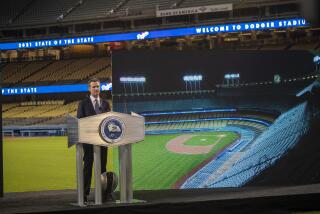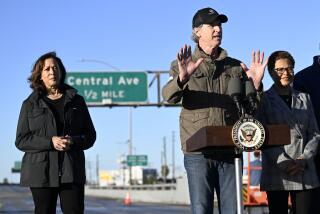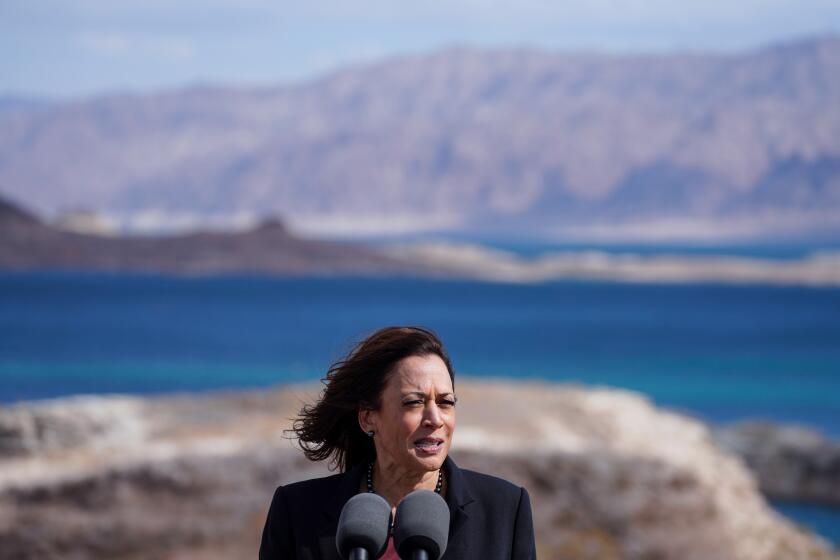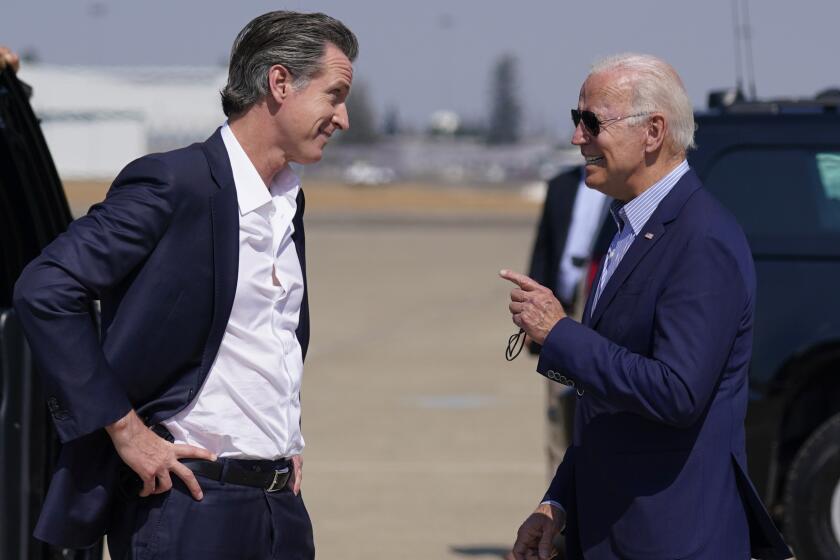Q&A: Gavin Newsom on his ‘mayoral mind-set’ in first 100 days in office
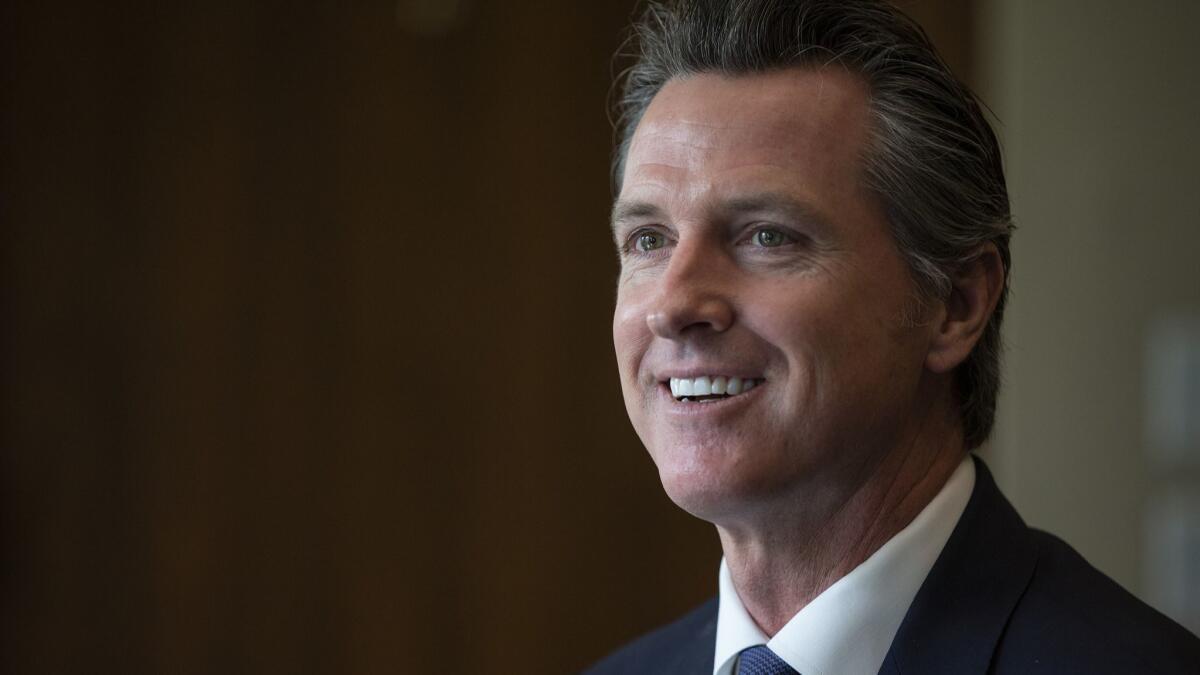
Gavin Newsom’s whirlwind start as California governor has been punctuated by a contemptuous feud with President Trump, a politically risky ban on the death penalty and an occasional backtrack or stumble. But he says his first 100 days as governor have been driven by an “in the weeds” mind-set and sense of urgency to address the state’s many needs and intractable ills.
Newsom dismissed criticism that a more measured approach focused on a few, select political priorities each year, a hallmark of his predecessor Jerry Brown, may be more effective than launching the weighty progressive agenda all at once.
“We said we wanted to be bold. We had a platform: Courage for a change,” Newsom said in an interview with the Los Angeles Times. It wasn’t an indictment of the status quo. It was an expression of the willingness to take on some of these vexing issues, to lean in to some of these issues, and to see what we can shape.”
Newsom said the Californians who elected him expect nothing less than immediate and aggressive action on affordable housing, addressing homelessness, expanding early childhood education and other pressing needs in the state.
“I sweat the small stuff. There is a mayoral mind-set here in terms of recognizing that there are a lot of issues that need to be attended to, and if the chief executive doesn’t attend to, often they’re neglected,” Newsom, a former two-term San Francisco mayor. “We just want to go farther than we’re expected to go.”
Newsom went pretty far during his first week in office, when he warned cities and counties that he was coming for their road repair funding if they didn’t meet state goals for new housing. Two months later, Newsom set aside those plans for four years.
Newsom also stirred up confusion when, in his State of the State speech, he criticized the state’s $77 billion high-speed rail project by saying it would “cost too much and, respectfully, take too long.” Just hours after Newsom said there was “no path” to have the rail line connect San Diego to San Francisco, Trump demanded California return $3.5 billion in federal funds for the project, forcing Newsom to clarify that he supported the entire rail system.
Newsom said the majority of his agenda is intertwined with his $209-billion budget proposal, which proposes a vast expansion of California’s safety net for the poor and relies on a record-setting tax revenue estimate to boost public schools and healthcare programs.
Newsom’s first spending plan is currently contorting its way through the California Legislature, a process that will test the political steel and negotiating prowess of the governor as he bargains with a Democratic leadership feeling unbridled after Brown’s eight-year reign.
“I think the budget is going to be the truest test of the success of the first 100 days,” Newsom said.
Newsom discussed his priorities and biggest surprise in office during an interview with The Times on Monday. The conversation was edited for both length and clarity.
You have introduced and announced a lot of major policy proposals, but it’s hard to tell your priorities. What are they?
There’s a lot of things that I think need to be done in the state. I’ve never subscribed to the point of view that one should limit themselves to just a few things when there are many things that need to be done.
I believe you can go deep into more than one or two things. I got elected on making a lot of commitments on policy proposals, and I want to follow through on those commitments. I think the people who elected me expected nothing less. I said I was going to be bold on housing, I was going to be bold on education, on healthcare. I was going to do more on preschool and early childhood education. I was going to get under the hood on a series of issues. So we’re doing that.
You’ve held a lot of different offices. What has surprised you the most so far about this job?
The time and attention that Trump has devoted on California. Intellectually, I anticipated, I expected a lot of it. But it’s interesting. Look I’m governing the most un-Trump state in America and his pronouncements [are] almost on a weekly basis, consistent. In some ways it shouldn’t surprise because … you have some of the most iconic Democratic leaders that emanate from this state in positions of real power and influence, and obviously California played an outsized role in his popular vote defeat and he’s still left raw about that.
I just wish there was a week that went by where you weren’t forced to ask me, ‘I’m sure you saw Trump’s tweet?’ That’s the beginning of almost every conversation and that surprises me. I get it. And it’s the right question.
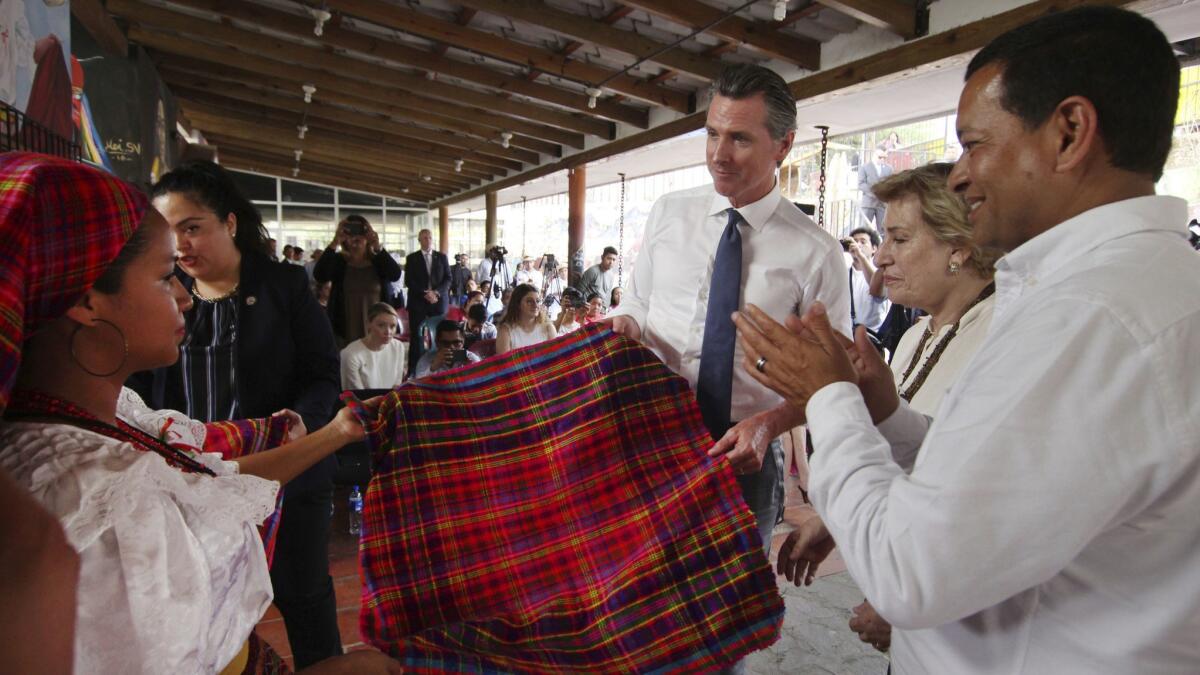
As ambitious as your agenda may be, there are Democrats in the Legislature who want to do more, on paid family leave and Medi-Cal expansion for example. How do you deal with that?
They’re right, they’re not wrong. It’s about building blocks. It’s about a system, what it can absorb. It’s about quality, not just quantity. On preschool, even if we put up all the money to provide universal preschool, the infrastructure couldn’t be built out. There’s physical limitations on childcare and preschool. We actually physically have to build out the facilities. There’s human capital where we actually have to train the caregivers and we need to invest in the workforce.
There’s a great sense of urgency. I share it. But there’s a need to build out that architecture. I think what we did this year was we made robust investments that were not just symbolic, they were substantive, and with it I announced concurrently these teams of people that are working then to build out the plan over the course of the next few years. So it wasn’t just monetary, but it was organizing a narrative where we’re working with the stakeholders bringing people to the table and saying: Here’s what we hope to do next year and the year after, etc.
Substantively as well on paid sick leave, and that was one of the first investments we made. That’s led as you know by my chief of staff. That was quite literally her top priority, the predicate for her taking the job.
How well has your family transitioned to life in Sacramento and your new home in the suburb of Fair Oaks?
It’s good. The biggest transition is, they’ve never had scrutiny like this, my wife nor the kids. I could show you some emails from teachers at school. It’s tough. But it’s also exciting to them at the same time.
There’s a lot of scrutiny. A lot of opinions. Parents have children, and often times parents share their opinions of others to their children, and those are shared. This is not a liberal bastion, Fair Oaks. So it’s interesting.
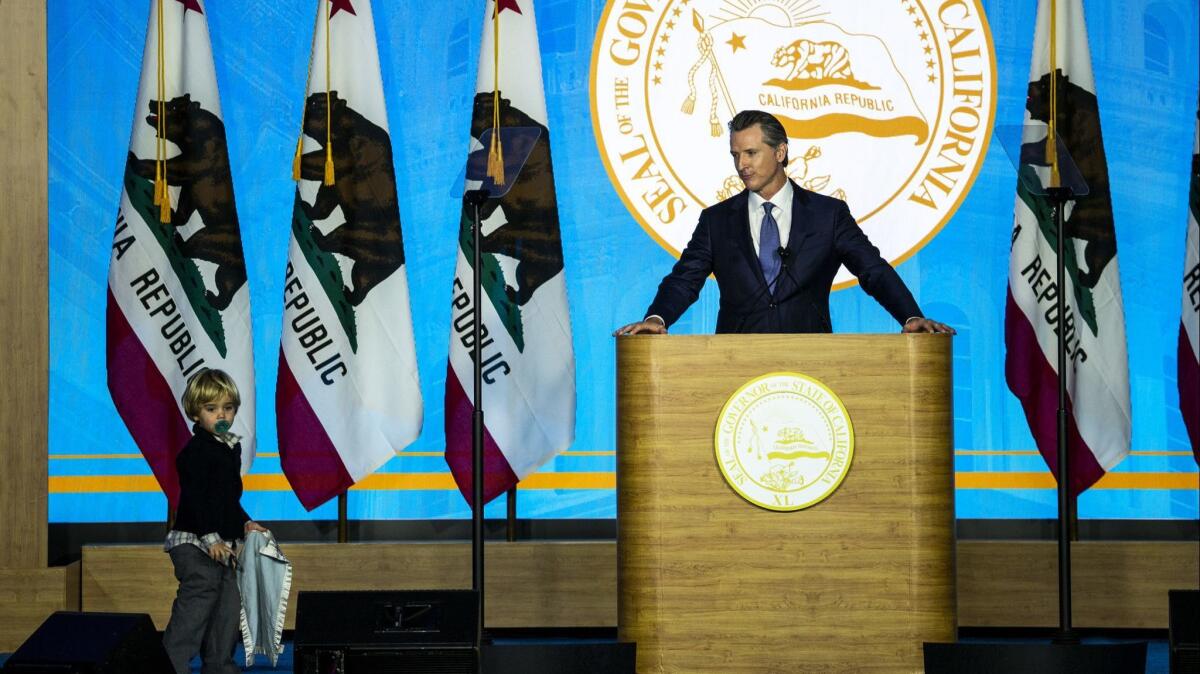
Fair Oaks has reputation for good public schools. Are your kids going to public or private school?
They’re going to preschool and ... private.
Why make that decision, private over public?
We moved them midyear and it was the best decision for the kids. Because we moved them in the middle of the school year, from a public school, that was the school that was quickest to accommodate that.
There’s legislation to increase regulation and oversight over charter schools. The expectation is that you would be friendly to that because of your comments during campaign.
Most of the legislation that’s been introduced this year has been introduced multiple years, so none of it is particularly surprising. I think the energy around it is. That’s why we’re very pleased to get that fast-track legislation on transparency to my desk as quickly as we could, which I campaigned on, as you know. I’m very proud of that. That shows what government can do when you’re committed to something in the short term. There was an 11-year debate just on that issue and we were able to get that over the edge.
I’m hopeful that we can find areas of commonality and address these issues. The first text I got at 6:33 a.m. this morning was on some backchannel conversations with some of the charter school members about what’s going on in areas where we actually may see some commonality. So we’re working diligently with [state Superintendent of Public Instruction Tony Thurmond] and we’re hoping to complete those efforts.
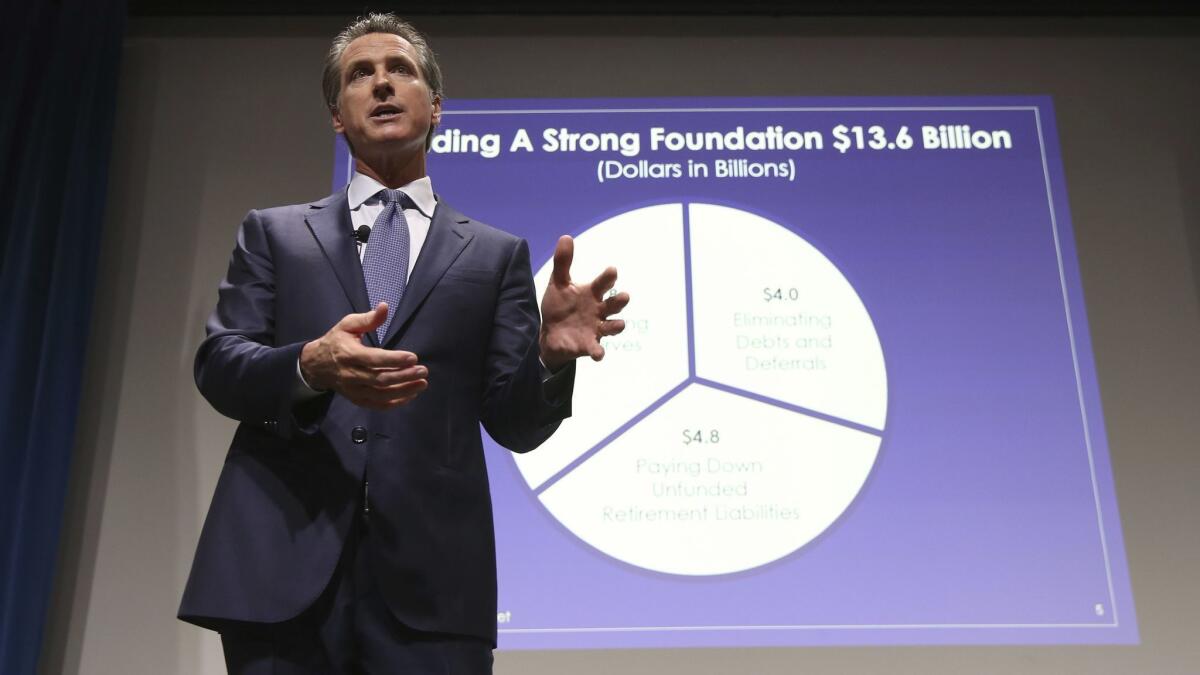
At his point in the interview, Newsom made what amounted to a closing argument.
I think it’s just a shift in the administration’s approach. I think we’re much more proactive earlier on in the process. The budget reflected that.
It goes to my approach. I’m trying to get in the weeds. I’m trying to get into the details. I think the devil is in the details. I think details matter. I know I approach government very differently in this role. And it goes to your question about just one or two big priorities. I’ve read a book, “Don’t Sweat the Small Stuff” and then I read an article saying “sweat the small stuff.” I was persuaded more by the article than the book. I sweat the small stuff. There is a mayoral mind-set here in terms of recognizing that there are a lot of issues that need to be attended to and if the chief executive doesn’t attend to, often they’re neglected. I think there are a lot of areas in government that need to be improved. I’m not satisfied with the efficiency and the transparency and the efficacy that’s reflected in many agencies. DMV is a top example of that.
I think the budget is going to be the truest test of the success of the first 100 days. I think the budget will be truly reflective of that, where we come out on that. I’m not exaggerating, there are quite literally 70 or 80 things I promised on the campaign trail that are reflected in that budget — small things and big things.
The most high-profile things, certainly, have been trying to govern California in a Trump administration, and to be a positive alternative, and you’re seeing that response on healthcare, on immigration. I’ll tell you, we have a budget that contrasts the Trump administration in terms of its fiscal discipline. We’re not arguing to run deficits, we’re actually paying off all our debt. We’re paying down pension obligations. It contrasts rather significantly, not just on immigration and healthcare, but our approach is very different than the one being advanced in Washington D.C.
Twitter: @philwillon
More to Read
Get the L.A. Times Politics newsletter
Deeply reported insights into legislation, politics and policy from Sacramento, Washington and beyond. In your inbox three times per week.
You may occasionally receive promotional content from the Los Angeles Times.

